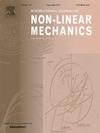Data-driven structural identification of nonlinear assemblies: Uncertainty Quantification
IF 2.8
3区 工程技术
Q2 MECHANICS
International Journal of Non-Linear Mechanics
Pub Date : 2024-12-26
DOI:10.1016/j.ijnonlinmec.2024.105002
引用次数: 0
Abstract
Nonlinear model identification from vibration data is challenging due to limited measured data collected during the testing campaign and since the identified model should be capable of accounting for the uncertainties arising from the reassembly of the structure, environmental effects, and slight changes in parameters as a result of wear during vibration testing. In this paper, a new technique based on ensembling is proposed for uncertainty quantification during the identification of nonlinear assemblies using multiple data sets. First, an ensemble of parsimonious models is identified using a physics-informed nonlinear model identification method from subsets of measured data. Aggregate model statistics are then employed to calculate inclusion probabilities for the candidate model, which enable uncertainty quantification and a probabilistic estimate of the dynamic response. This results in a robust nonlinear model identification with physical interoperability. An application on a single-degree-of-freedom system idealised for an experimental structure with geometric and friction nonlinearities is presented. The results obtained demonstrate the substantial performance of the proposed technique in selecting accurate nonlinear models that capture the response over a large range of variability and repeatability for real-world data sets.
求助全文
约1分钟内获得全文
求助全文
来源期刊
CiteScore
5.50
自引率
9.40%
发文量
192
审稿时长
67 days
期刊介绍:
The International Journal of Non-Linear Mechanics provides a specific medium for dissemination of high-quality research results in the various areas of theoretical, applied, and experimental mechanics of solids, fluids, structures, and systems where the phenomena are inherently non-linear.
The journal brings together original results in non-linear problems in elasticity, plasticity, dynamics, vibrations, wave-propagation, rheology, fluid-structure interaction systems, stability, biomechanics, micro- and nano-structures, materials, metamaterials, and in other diverse areas.
Papers may be analytical, computational or experimental in nature. Treatments of non-linear differential equations wherein solutions and properties of solutions are emphasized but physical aspects are not adequately relevant, will not be considered for possible publication. Both deterministic and stochastic approaches are fostered. Contributions pertaining to both established and emerging fields are encouraged.

 求助内容:
求助内容: 应助结果提醒方式:
应助结果提醒方式:


